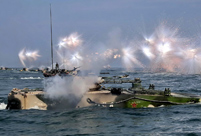 Amphibious armored vehicle unit conducts open sea drill
Amphibious armored vehicle unit conducts open sea drill
 Water relay in Henan
Water relay in Henan
 Ethnic culture feasts eyes of travelers
Ethnic culture feasts eyes of travelers
 80 security dogs assembled in Nanjing police dog training base
80 security dogs assembled in Nanjing police dog training base
 Graffiti artists paint on street walls in Xinjiang
Graffiti artists paint on street walls in Xinjiang
 Story of ceramic artist Zhang Lingyun
Story of ceramic artist Zhang Lingyun
 Magic summer night dream in Hongyuan
Magic summer night dream in Hongyuan
 Incredible creatures in headwaters drainage region of Lancang River
Incredible creatures in headwaters drainage region of Lancang River
 The future of rock n' roll seen in young rockers in China
The future of rock n' roll seen in young rockers in China
 Magnificent Yanziya Cliff
Magnificent Yanziya Cliff
US Defense Secretary Chuk Hagal urged China to conform to international rules during his recent visit to Australia. But who is actually breaking the rules?
Let’s take a look at US conduct.
First, the US is backing the Japanese government’s proposal to end the ban on collective self-defense though Japan has a history of aggression and has still not recognized its previous war crimes. The ban has prevented the Japanese military from fighting overseas since World War Two. Even worse, the US now states that Diaoyu Islands is covered by the Japan-US Security Pact. Instead of forcing Japan to reflect on its war crimes, the US is helping Japan to become more aggressive.
Second, the US and Philippines have signed the Enhanced Defense Cooperation Agreement (EDCA) to bolster the US-Philippines security relationship by allowing the United States to station troops and conduct operations on Philippine territory. Even some Philippine organizations believe that the agreement breaks the ban on foreign military bases in the Philippines that is stipulated in the Philippine constitution.
Third, on regional island disputes, the US repeatedly promises to keep neutral. But US officials continually break this promise. They ignore the provocations of Japan and Philippines against China and inveigh against China despite the fact that China is only trying to safeguard its legitimate rights.
The US has signed a 25-year military pact with Australia. It is clear that the US is strengthening relations with Japan and Australia as part of a strategic positioning. The move is obviously intended to interfere with China's progress.
Let’s look at what America's “friends” have done.
Japan has repeatedly sought to provoke China in order to further the new US strategy. In 2012, the Japanese government made an offer to “buy” the Diaoyu Islands. In recent years, Japan has sent its Air Self-Defense Force to harass China’s patrol aircraft and reconnaissance aircraft which were flying over sea areas under its jurisdiction completely in accordance with international law.
Neither do the Philippines conform to international rules. The baseline bill that brought some of China's islands and reefs in the South China Sea into Philippines' territorial waters was signed into law in 2009. In 2012 the Philippines sent a warship to arrest Chinese fishermen in Chinese waters. Such acts are beyond the tolerance of China.
In contrast, China abides by international rules and conventions in dealing with China South Sea Disputes. China proposes to resolve the disputes via friendly negotiation, contributing to regional peace. It is clear that it is the US rather than China that is breaking the international rules. China will not tolerate this reckless bullying. China will respond to provocation from other countries.
This article was edited and translated from 《到底是谁破坏了规矩》, source: People's Daily Overseas Edition, Author: Zhang Junshe
 Beijing policewomen posters become a hit
Beijing policewomen posters become a hit Armored regiment trains on the sea
Armored regiment trains on the sea Children spend 'Father's Day' with dads at work
Children spend 'Father's Day' with dads at work 'Pan Da' appear in Shanghai World Financial Center
'Pan Da' appear in Shanghai World Financial Center Champions take selfies on podium
Champions take selfies on podium National Fitness Day celebrated around China
National Fitness Day celebrated around China Traditional culture colors summer vacation
Traditional culture colors summer vacation Young athletes fighting for their dreams
Young athletes fighting for their dreams 68 meters high thermometer in Shanxi, called ‘fighter’ of thermometers
68 meters high thermometer in Shanxi, called ‘fighter’ of thermometers The vanishing folk skills
The vanishing folk skills Intoxicating beauty of Dali, Yunnan province
Intoxicating beauty of Dali, Yunnan province Memorable moments of Ludian earthquake
Memorable moments of Ludian earthquake Bring world together to help elephant
Bring world together to help elephant 'Building Dreams'
'Building Dreams'  Labrang Monastery
Labrang MonasteryDay|Week|Month